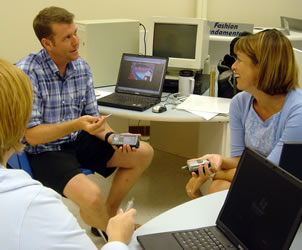Norfolk Summer Project
This summer, I had the opportunity to work with a wide range of groups on many different projects! Although I enjoy speaking at conferences and inservice days, it's the one-on-one time at multiple day summer workshops and courses that provide the opportunity to really dive into the creation of exciting projects.
|
Norfolk Summer Project This was my third visit to Norfolk, Virginia working with a group of teachers from the Norfolk Schools.
|
Week 1: Transforming Classrooms The TAC teachers spent a week developing innovative approaches to transforming classrooms. We focused on 4Ts: Topics, Testing, Techniques, and Technology. This included exploring essential questions, critical topics and standards; examining test scores and seeking connections across content areas; learning new teaching strategies and techniques; and applying technology to transform classrooms. We started by brainstorming topics, approaches, and ideas. People contributed ideas and helped each other with resources. A few new technology tools, templates, and approaches were presented and explored. In the photo below, two teachers are discussing and sharing their projects.
While teachers worked on their developing projects, the coordinators (Kathleen and I) created and refined a WebQuest that followed the process and could be used in future projects. Blackboard (an Internet-based forum tool) was used to journal experiences, make requests, ask questions, and share ideas. Each teacher developed a project for immediate implementation. At the same time, they considered how the ideas could be generalized to other areas of the curriculum. The entire process was recorded by a video crew from the WHRO public television station. They are producing a video program focusing on innovative approaches to teaching, learning, and professional development.
|
During the second week, students were invited to participate in a morning technology camp. The students were divided into elementary, middle, and high school teams. Buses brought students from throughout the school district to participate. |
Each teacher worked with a small group of students on the project they created during the previous week. In some cases, the students worked on the same project all-week. In other cases, they shifted between two or three different projects. Topics included history, math/science, social studies, and English. Although all the projects used technology, they often used other resources such as books, handouts, markers, post-it notes, manipulatives, and other materials. For example, a project called "Freedom Documents" incorporated books, worksheets, founding people dolls, and post-it notes. |
   |
Student Involvement
|
|
For example, one teacher developed a PowerQuest called Jamestown Journalism. The people of historic Jamestown were facing all kinds of dilemmas. The job of the student was to help them solve their problem. |
|
Afternoon Reflection During the week of technology camp, teachers spent the afternoon revising materials, discussing new projects, developing an electronic scrapbook of their experiences, and learning new technology skills. After a while everyone got pretty relaxed with the video cameras and digital cameras around all the time. In the photo on the right, Steve, a high school teacher, practices "safe computing" by wearing his bike helmet. |
|
|
However, sometimes the students couldn't resist "hamming it up" for the camera.
|
Technology Tools The students used a wide range of resources and tools for their projects. They used computers, Internet, Microsoft Word, Microsoft PowerPoint, Microsoft Excel, Microsoft Paint, Inspiration, and many other tools. For example, Inspiration software was used by a middle school student to create the concept map below focusing on the scientific method.
Each student received a "thumb drive" that could be used to store and share projects. Students used books and other materials along with computers.
|
The two weeks were a great learning experience for both teachers and students. From high school students working on a forensics problem to elementary students designing a virtual field trip to Historic Monticello, everyone found the technology camp a great learning experience. |
Friendships One of the most exciting parts of the summer was the growing relationship among the teachers participating in the program. From the first day brainstorming topics to the last day of reflecting, everyone helped and encouraged each other.
Although the original TAC project is at an end, the relationships of the teachers and the legacy of their work has just begun.
|
Go to Lamb & Johnson Menu
|
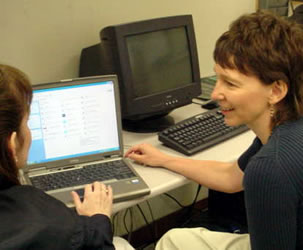 Although it's always hectic, summer professional development activities are a great chance to work with teachers and students on fun, practical projects.
Although it's always hectic, summer professional development activities are a great chance to work with teachers and students on fun, practical projects. 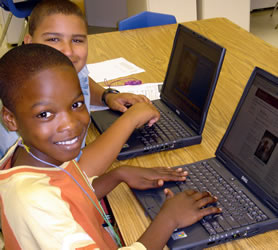 In the spring, Kathleen Sharp and I began discussing the possibility of an innovative summer professional development program combining traditional workshops, curriculum development time, and a technology camp for students.
In the spring, Kathleen Sharp and I began discussing the possibility of an innovative summer professional development program combining traditional workshops, curriculum development time, and a technology camp for students. 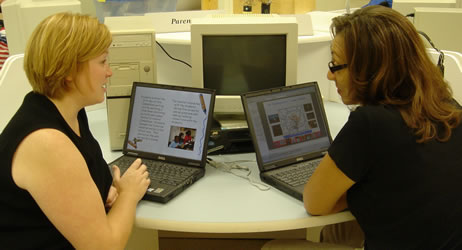
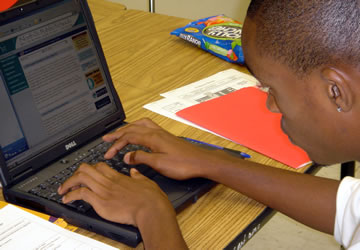
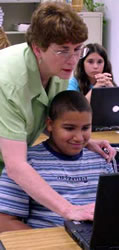
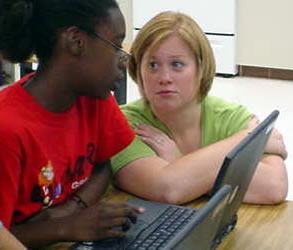 It was exciting to see students actively engaged in a variety of meaningful projects. Teachers worked one-on-one with students, made observations, and reflected on how to improve the instructional materials and learning experience.
It was exciting to see students actively engaged in a variety of meaningful projects. Teachers worked one-on-one with students, made observations, and reflected on how to improve the instructional materials and learning experience. 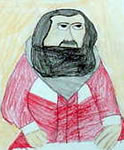 Some teachers involved students with expanding the projects.
Some teachers involved students with expanding the projects. 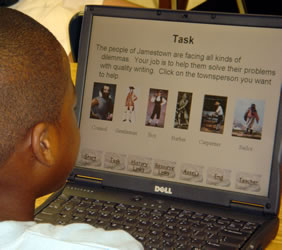 The teacher asked her children to create drawings of the people from historic Jamestown that could be incorporated into program.
The teacher asked her children to create drawings of the people from historic Jamestown that could be incorporated into program.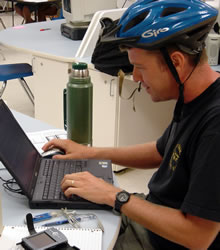
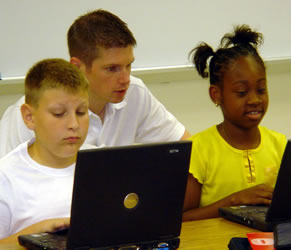 The students also got into the act. Most of the time, the camera caught the students working hard on their projects. For example, the students on the left are building an Animal Kingdom Amusement park.
The students also got into the act. Most of the time, the camera caught the students working hard on their projects. For example, the students on the left are building an Animal Kingdom Amusement park. 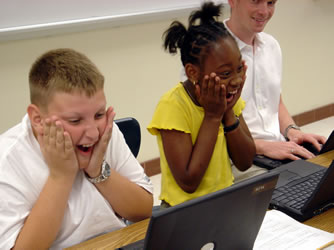
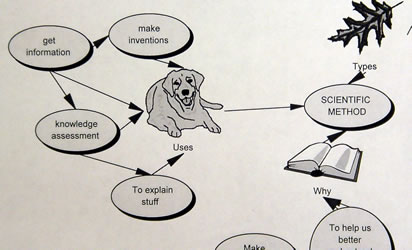

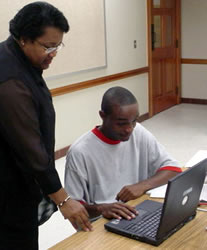 Great Learning Experience
Great Learning Experience